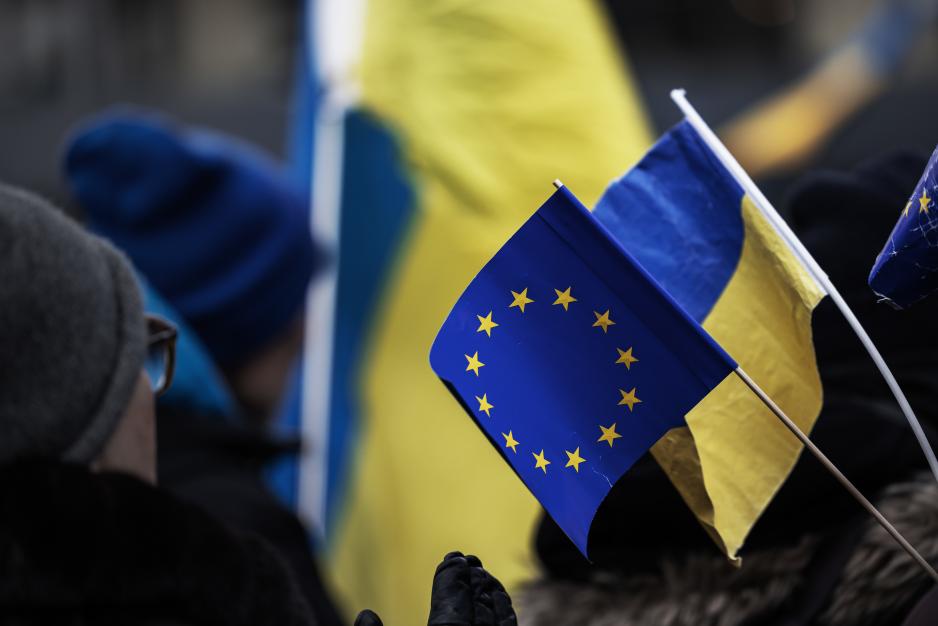Upcoming EU Sanctions Look Set To Block Transshipment of Russian LNG, But Allow Imports

Demonstration with EU and Ukrainian flags in support of Ukraine in 2023. (Source: Josefine Stenersen under CC BY-ND 2.0)
The EU looks set to target existing Russian production of liquefied natural gas for the first time as part of the upcoming 14th sanction package. While previous sanctions focused on inhibiting future LNG projects, attention could now begin to shift to already producing facilities.
The EU continues to revise its approach toward the flow of Russian liquefied natural gas (LNG) into the continent.
As part of a compromise proposed by the European Commission a ban on the re-loading and transshipment of LNG in EU ports has emerged. But the bloc would for now shy away from passing a full ban on Russian imports.
The proposal would allow EU member states, primarily Spain, France and Belgium, to continue using Russian LNG as part of their energy mix but would bar EU ports from re-exporting any supplies.
At present around 25-30 percent of Russian LNG that enters the EU is subsequently re-loaded and shipped to third countries outside Europe.
A full ban was unlikely to garner the required unanimous support of all 27 members even after major economies like Germany and Italy came out in support of a ban.
A ban on transshipments could be proposed as a compromise
“Currently even Italy and Germany have expressed that they are in favor of such measures. In reality an LNG import ban will probably be blocked or altered to a clear phase-out path for the EU, explained Angelos Koutsis, Energy Policy Officer at Bond Beter Leefmilieu at Belgian environmental and nature organization.
“A ban on transshipments could be proposed as a compromise,” he concluded, referring to the state of negotiations in Brussels last week.
Such a pathway has now apparently emerged based on the draft text.
"This provision does not affect imports into the EU. Such a measure limits the expansion of Russia’s LNG capacity and thereby limits Russia’s revenues," the proposal reads according to Politico.
After the now-to-follow discussions among member states the proposed measures would become part of the upcoming 14th sanctions package.
Allow for force majeure
Around two-thirds of transshipments pass through the Belgian port of Zeebrugge. An EU-wide ban on the reloading would follow calls by the Belgian government that a binding agreement was needed to effectuate a change. Non-binding efforts by the European Parliament a few weeks ago did not immediately prove effective.
The proposed sanctions would allow companies involved in transshipment operations, including the operator of the Zeebrugge hub Fluxys, to declare force majeure shielding them from legal claims arising from their contractual obligations.
Several European companies, including France’s TotalEnergies, already declared force majeure at the end of 2023 related to U.S. sanctions on the upcoming Arctic LNG 2 project.
Key to Russia’s export scheme
Russia’s ability to access EU ports to receive and transfer LNG from Arctic-capable carriers to conventional carriers has been a key to selling its gas to global markets. Without access to land-based facilities it may resort to ship-to-ship transfers in Russian or international waters.
Novatek, the operator of the Yamal LNG facility, previously engaged in reloading operations in Norwegian waters off the coast of Honningsvåg and continues to do so off the Kildin anchorage to the north of Murmansk.
However, these ship-to-ship operations require relatively calm seas and do not offer the same flexibility and schedule reliability as port-based terminals.
An EU-wide ban would force Novatek to adapt its logistics model and would likely slow down its ability to sell the 3.78 billion cubic meters of LNG, which pass through Zeebrugge and Montoir-de-Bretagne in France every year.
The proposed sanctions suggest that Western bans may now begin targeting existing Russian LNG supplies. Up to this point, EU and U.S. measures have been focused on inhibiting the country’s ability to construct new LNG projects and deliver those supplies to markets.
An EU ban on transshipments would, for the first time, directly target existing Russian LNG production.




